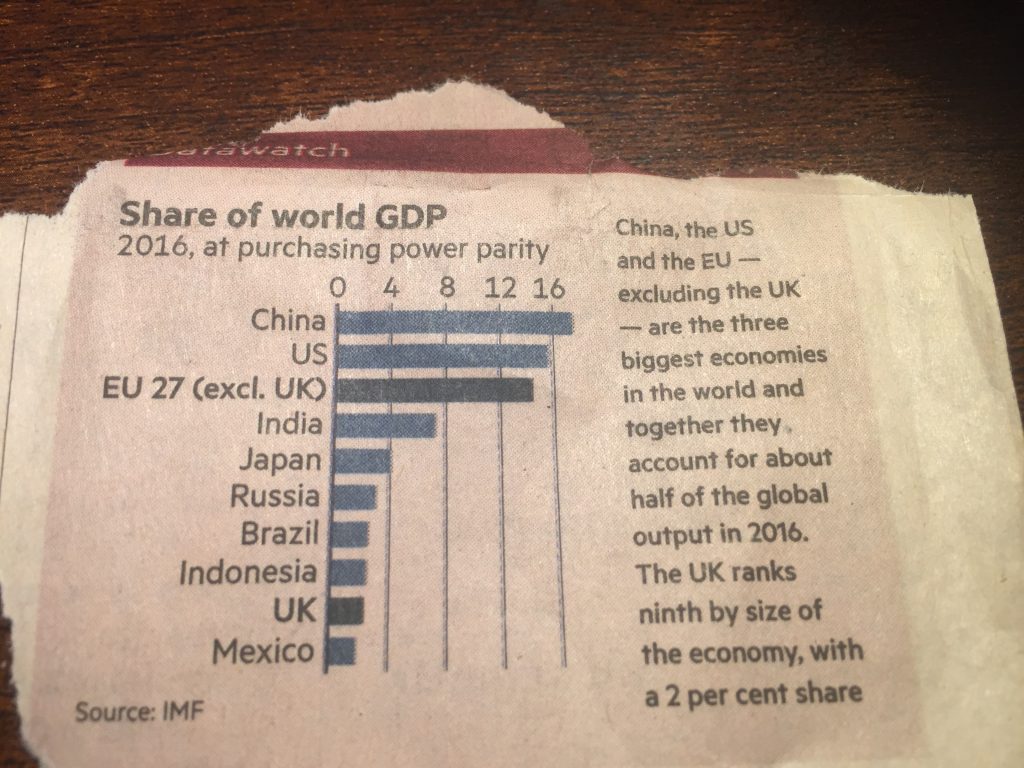The UK falls to ninth place, just ahead of Mexico and behind Indonesia. And that is the UK including Scotland. Data from the dastardly IMF, whose business is to be right about these things. Image of a graph in the Financial Times 2 July.
Coming Soon to a Screen Near You
Sites change. Although I’ll continue to post longer pieces, mostly from my archives, this one will shortly assume a different beat.
Jihad, Ijtihad and other Dialogical Wars
Western audiences, out of ignorance, yield too easily
to fundamentalist Muslim claims that Islam is prescriptive
in simple ways. To argue otherwise requires knowledge
of Islamic hermeneutics, dialectics, and dialogics.
— Fischer and Abedi, Debating Muslims (p. 147)
Twenty years ago I published an academic piece on three North African writers which went largely unread — par for that course to be sure.
Jihad Ijtihad and other Dialogical Wars
I offer this link to the past because its matter remains topical. It explains in accessible terms to readers of English the concepts of jihad and its cognate ijtihad, as well as the relationship of each to the other.
They anchor each end of a dialogical continuum running from holy war through conversion (by various means) and maieutic (giving birth to ideas) on to the hermeneutics of ijtihad, which might be defined as “interpretative work”. Ijtihad began before jihad, since Allah’s edict to Muhammad at the moment of revelation was إقرا iqra! read! / recite!, which does after all require interpretation.
As interpretation of the work for which jihad calls, ijtihad must be understood dialectically (in light of the range of counter-arguments), hermeneutically (in terms of allusions and contexts, nuances and changes in word usage), and dialogically (in relation to the motives and manipulations of political others to whom one is opposed).
Both jihad and ijtihad are “ethical discourse”. They are conducted in a communicative environment driven by dialogue with others, by attempts to persuade those others “to join one’s own moral and political community” (Fischer and Abedi, p. 146). It should therefore not be surprising that poetry sometimes plays a persuasive role in Islamicist polemic and propaganda: http://www.theguardian.com/books/2015/dec/29/poetry-used-as-a-perfect-weapon-for-recruiting-violent-jihadis-study-finds.
My point? Just read the epigraph again.
If you have declared someone an enemy or have been declared an enemy by someone else, best learn to know them (dixit Sun Tzu in The Art of War). The way it looks for the moment, the jihadis of Da’esh have a better grasp of the vulnerabilities of the so-called West — susceptibility to bouts of collective fear, self-indulgent materialism — than the West does of theirs, whatever either may be.
China’s Silk Road Imperialism from a Leninist Perspective
Liberals, neo- or not, tend to dismiss Marxist theory as voluntarist drivel, a reflection of evil intentions, not analysis amenable to verification. Hence my surprise the other day in reading this excerpt from the Financial Times in a series on China’s Great Game in Central Asia:
“Lenin’s theory that imperialism is driven by capitalist surpluses seems to hold true, oddly, in one of the last (ostensibly) Leninist countries in the world. It is no coincidence that the Silk Road strategy coincides with the aftermath of an investment boom that has left vast overcapacity and a need to find new markets abroad.” (13 Oct 2015, p. 9)
The debate over the economic causes of imperialism survived the crisis in orthodox, state-sanctioned Marxism, in part because it had been incorporated into Third World and World Systems theory then embraced by the anti-globalization movements which taddress the inequities among the most, the more, the less and the least economically developed societies around the globe. Inequities also prevail within each of those sectors.
Here, in what we persist in calling the West, prolonged stagnation of income, pervasive impoverishment and creeping lumpen-proletariatization have meant slumping internal markets. To export their surplus of profit, corporations based in the capitalist democracies now need foreign consumers — the unbridled creation of credit, aka debt, to feed domestic consumption having revealed its shortcomings in 2008.
In China, given its recent boom, the problem is similar, though more acute.
Beijing must find sufficient external demand for its products and goods to avoid recession, depression or even collapse, of the economy first, then of the regime. This is why China must expand into Central Asia. Its province of Xinjiang (New Frontier 新疆, or in its other official, Uyghur transcription شىنجاڭ) as well as the hinterland in the Stans are as important to this recently established, naturally continentally-minded dynasty as its maritime zones of influence, both the seas adjacent to the western Pacific which bear its name (East China Sea, South China Sea), and the “String of Pearls” which connects its prosperous coast through the Strait of Malacca to the Middle East and Europe. From a Leninist, though even from a purely merchantilist perspective, the Trans-Pacific Partnership which excludes China from crucial east Asian and west Pacific markets will push China even more strongly into central Asia.
Lenin’s argument was initially directed against his rival Karl Kautsky’s 1914 typically social-democratic bout of wishful thinking that capitalism’s tendency towards cartel monopoly would lead to a phase of ultra-imperialism in which the great powers subsume their nationalist antagonisms and cooperate jointly in the exploitation of the periphery, thus avoiding war. Lenin correctly saw — retrospectively in 1917, let us note — that the ever-shifting balance of powers among competitive capitalist states precluded such co-operation. Put another way: state politics trump economics.
So it is not odd, in fact the odds favour that the capitalist powers, soon prima inter pares China, will be drawn into military conflict in a tragic reprise of the internal contradictions which engendered the First World War, but also the first explicitly anti-capitalist revolution, the one associated with Lenin’s name. The next anti-capitalist revolution remains to be imagined. If the past is any measure, it will follow upon a cataclysm unavoidable as long as the logic of capitalist accumulation prevails as international law.
*
The Financial Times article can be accessed in on the Uyghur Human Rights Project / UHRP website (no firewall). http://uhrp.org/featured-articles/china’s-great-game-new-frontier-old-foes
Lenin’s theory of imperialism: https://en.wikipedia.org/wiki/Imperialism,_the_Highest_Stage_of_Capitalism
World Systems Theory: https://en.wikipedia.org/wiki/World-systems_theory
Kautsky’s Ultra-imperialism: https://en.wikipedia.org/wiki/Ultra-imperialism
China’s Silk Road initiative: https://en.wikipedia.org/wiki/The_Silk_Road_Economic_Belt_and_the_21st-century_Maritime_Silk_Road
China’s String of Pearls strategy: https://en.wikipedia.org/wiki/String_of_Pearls_(Indian_Ocean)
The Trans-Pacific Partnership (TPP): https://en.wikipedia.org/wiki/Trans-Pacific_Partnership
Pascal’s Conditional, Subjunctive Wager
Since the age of sixteen, I have entertained discussions with a friend it would not be wrong to call a theologian. For most of our adult lives, we were out of touch, though he was always in my thoughts, the way everything and everyone have always been in our thoughts when we come to think of them again.
Last year, we renewed contact and, naturally, re-engaged with our debate.
One of his thrusts or parries led me to reflect on other stages of my life in which I had not only concourse but friendship and even intercourse with religious persons, learning to speak the terminology of theology and doctrine with them in order to communicate.
His question turned around Pascal’s wager that each and every human bets that God exists, or not. Given that such might be the case and taking into consideration the infinite gain or loss associated with belief, unbelief or disbelief in said God (an eternity in either heaven or hell), per Pascal any rational person ought to live as if God exists and seek to believe in Him. If God did not actually exist, such a losing gambler would suffer not infinite but mere finite loss, measurable because imaginable, pleasures more likely than not sensual, and measured in the end against an infinity in hell.
Though admiring Pascal’s logic, which contributed to probability theory, I was never happy with his assumption that we could “pretend as if we believe” and God wouldn’t know or care about how false any virtue we thereby attained might be. This attitude betrays my Protestant orientation, since I presume that a relationship with God or even with a god would be not only personal but sincere, without mediation.
Ironically, the most telling description I ever heard of this “knowingness” of God was not from a Christian, rather a Muslim, the Imam of one of the first mosques in North America, Al Rashid, founded in Edmonton in the 1930s. In 1986, I ceremoniously converted to Islam in order to marry Nasrin legally in the eyes of the Iranian government — a legal procedure which facilitated her life and lent her a margin of safety in the early years of the Iranian Revolution, when she had to travel back for family reasons. The Sunni Lebanese Imam who married us and who filled out the documents she submitted to the Iranian Embassy in Ottawa was doubtlessly aware that my conversion was factitious. At one point in our discussions about Islam he assured me that it was not important to him if I were sincere in my conversion, since that was a matter between myself and Allah. Allah would know, when the time came to know, what I really thought.
The notion of a panoptic deity is a terrifying one, even more disturbing than that of a panoptic state, of which one extreme model is the eighteenth century prison which Jeremy Bentham imagined and about which Michel Foucault later wrote. Foucault was the consummate Parisian intellectual, hence bore within the crypto-Protestant strain of Catholic Jansenism which remains strong among that national elite — one reason French Communism sank such deep roots. In his later thought, Foucault shifted towards a more orthodox Catholic perspective, arguing that confession to a human authority was the ultimate instrument of power and also of truth about one’s self, not collective observation of our acts. In other words, truth is institutional, not located in one’s own independent thoughts about oneself, or about God.
This passing, peripheral reflexion on privacy and confession is, I would argue, still relevent in this age of social media, selfies, and mass collection of that upstart deity, data.

